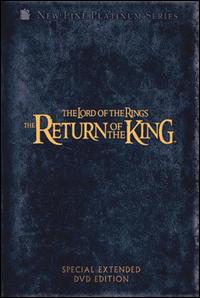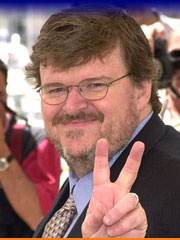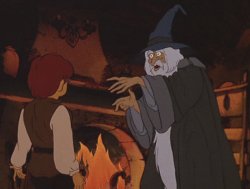From the geek archives: Jews, Tolkien, and a parting note to some ruddy little ignoramuses
Here’s a side note on Old is the New New’s interesting post on the origins of Superman (the origins of the fiction, that is, not Superman’s origin story within the fiction):
I'm also curious about the importance of Jewish identity to this story. Jones and Chabon remind us, if we need reminding, that most of the key figures in the origins of the superhero are Jewish. I sometimes wonder how much all of geek culture is a discourse on Jewishness in America. Not just the superhero thing, which is pretty obvious–nebbishy immigrants transforming into Nordic supermen to fight crooks and Nazis. I mean the whole cultural edifice of nerddom, from Amazing Stories to The Matrix.
A man is not a man until he owns land, Duddy.The suspiciously Wagnerian epics of Tolkien and Lucas. Jewish-American Henry Winkler in Italian-American juvie-face as the Fonz.The insult that made a man out of Mac.The whole geek-jockjust you wait until our 25th high school reunionbaggage that so many skinny (and fat) bespectacled kids carry around in their psyches. Is it all a secularized, de-ethnicized mastication of Philip Roth?
It’s an interesting point, and one which certainly needs to bear in mind the tangled knot of connections between Jewish identity and gender — the baggage carried along from the cultural association of Jewishness with effeminacy and femininity. In any case, though, in the provinces
points out in a comment:
J.R.R. Tolkien was neither American (an eminently English academic and Oxford don) nor Jewish–but an Englishmen of partially German (and eminently Christian German) descent. I’m not quite sure what he’s doing in an otherwise interesting commentary on Jews and geek culture in America.
Of course, how Tolkien’s work was received within the American geek culture being discussed is at least as interesting and relevant to the story as Tolkien himself. But, in any case, Rob replies in a comment:
Yes, you are right of course. And I knew writing it that Tolkien is quite the opposite of American or Jewish (he comes by his Wagnerian echoes much more honestly than George Lucas, you might say), so it was probably sloppy of me to toss him in there. He’s just so central to the geek mythos as I see it that any half-baked theory on geek culture has to find some way to accomodate him. I did try to keep that paragraph speculative, since my thinking on these subjects is very tentative.
Thanks for reading, though, and thanks for the comment.
And added the following in an update to the original post:
[Edit: I've been chastised, in comments below, for tossing J.R.R. Tolkien into that melting pot of American Jewish geekery, a fate he would have found more horrifying than Mount Doom. Obviously, Tolkien was neither American nor Jewish, and my half-baked theories about geek culture probably need some more baking before they can accomodate him. In the meantime, maybe I should revise that sentence to say
the epics of Asimov and Lucas,though Asimov's epics were really less Wagnerian than... what should I say... Thucidydean? Gibbonian?]
But while Tolkien certainly would have been alarmed to be confused with an American, mb
points out in a later comment:
Speaking of Tolkien, in his collected letters there is a fine letter from the late 1930s, when the Hobbit was being translated into German. As I recall it, he was asked to certify for the German publisher that he was
Aryan,ie non-Jewish, to which he replied that he had no idea what the termAryanmeant linguistically, and that he’d be quite proud to be Jewish, though he wasn’t. So Tolkien would probably besurprisedto be lumped in with the folks discussed above, but not necessarilyhorrified.
The letter that mb
is referring to is a letter to the Potsdam publishing house, R?@c3;bc;tten & Loening Verlag, dated 25 July 1938. Tolkien’s English publisher, Allen & Unwin, had agreed for R?@c3;bc;tten & Loening to publish a German translation of The Hobbit; soon after, Tolkien received a letter from R?@c3;bc;tten & Loening asking if he was arisch
(Aryan
) descent. Tolkien sent a letter (Letters of J.R.R. Tolkien, #29) to Allen & Unwin with two drafts of possible answers
to Allen & Unwin enclosed:
… I must say that the enclosed letter from R?@c3;bc;tten & Loening is a bit stiff. Do I suffer this impertinence because of the possession of a German name, or do their lunatic laws require a certificate of
arischorigin from all persons of all countries?Personally I should be inclined to refuse to give any Best?@c3;a4;tigung (although it happens that I can), and let a German translation go hang. In any case I should object strongly to any such declaration appearing in print. I do not regard the (probable) absence of all Jewish blood as necessarily honourable; and I have many Jewish friends, and should regret giving any colour to the notion that I subscribed to the wholly pernicious and unscientific race-doctrine.
You are primarily concerned, and I cannot jeopardize the chance of a German publication without your approval. So I submit two drafts of possible answers.
In one of the drafts, Tolkien refused to make any answer to the question (that’s the one which was probably sent to Germany); the other one is the only one preserved in Allen & Unwin’s files. Here’s the excerpt published in Letters of J.R.R. Tolkien (letter #30):
Dear Sirs,
Thank you for your letter …. I regret that I am not clear as to what you intend by arisch. I am not of Aryan extraction: that is Indo-iranian; as far as I am aware none of my ancestors spoke Hindustani, Persian, Gypsy, or any related dialects. But if I am to understand that you are enquiring whether I am of Jewish origin, I can only reply that I regret that I appear to have no ancestors of that gifted people. My great-great-grandfather came to England in the eighteenth century from Germany: the main part of my descent is therefore purely English, and I am an English subject — which should be sufficient. I have been accustomed, nonetheless, to wear my German name with pride, and continued to do so throughout the period of the late regrettable war, in which I served in the English army. I cannot, however, forbear to comment that if impertinent and irrelevant inquiries of this sort are to become the rule in matters of literature, then the time is not far distant when a German name will no longer be a source of pride.
Your enquiry is doubtless made in order to comply with the laws of your own country, but that this should be held to apply to the subjects of another state would be improper, even if it had (as it has not) any bearing whatsoever on the merits of my work or its suitability for publication, of which you appear to have satisfied yourselves without reference to my Abstammung.
I trust you will find this reply satisfactory, and
remain yours faithfully,
J. R. R. Tolkien
Tolkien, of course, would have been far more horrified to see how he has been appropriated, quite against his will, by illiterate fascist revivalists such as the National Vanguard and Prussian Blue
; for those folks, here’s another one (to his son Michael; Letters #45), for them to chew on:
I have spent most of my life, since I was your age, studying Germanic matters (in the general sense that includes England and Scandinavia). There is a great deal more force (and truth) than ignorant people imagine in the
Germanicideal. I was much attracted by it as an undergraduate (when Hitler was, I suppose, dabbling in paint, and had not heard of it), in reaction against theClassics.You have to understand the good in things, to detect the real evil. But no one ever calls on me tobroadcast, or do a postscript! Yet I suppose I know better than most what is the truth about thisNordicnonsense. Anyway, I have in this War a burning private grudge — which would probably make me a better soldier at 49 than I was at 22: against that ruddy little ignoramus Adolf Hitler (for the odd thing about demonic inspiration and impetus is that it in no way enhances the purely intellectual stature: it chiefly affects the mere will). Ruining, perverting, misapplying, and making for ever accursed, that noble northern spirit, a supreme contribution to Europe, which I have ever loved, and tried to present in its true light.–J. R. R. Tolkien to his son Michael, 9 June 1941
 J.R.R. Tolkien had a lingering suspicion that The Lord of the Rings was fundamentally an un-filmable story; he expressed the opinion that it was peculiarly unsuitable to dramatization and found himself disappointed (and a bit bewildered) at several attempts that were made at radio and film versions of his work. A couple of days ago, L. and I received Peter Jackson’s extended edition DVD of The Return of the King in a package on our doorstep. Tolkien was certainly right to worry–just look at
J.R.R. Tolkien had a lingering suspicion that The Lord of the Rings was fundamentally an un-filmable story; he expressed the opinion that it was peculiarly unsuitable to dramatization and found himself disappointed (and a bit bewildered) at several attempts that were made at radio and film versions of his work. A couple of days ago, L. and I received Peter Jackson’s extended edition DVD of The Return of the King in a package on our doorstep. Tolkien was certainly right to worry–just look at 

